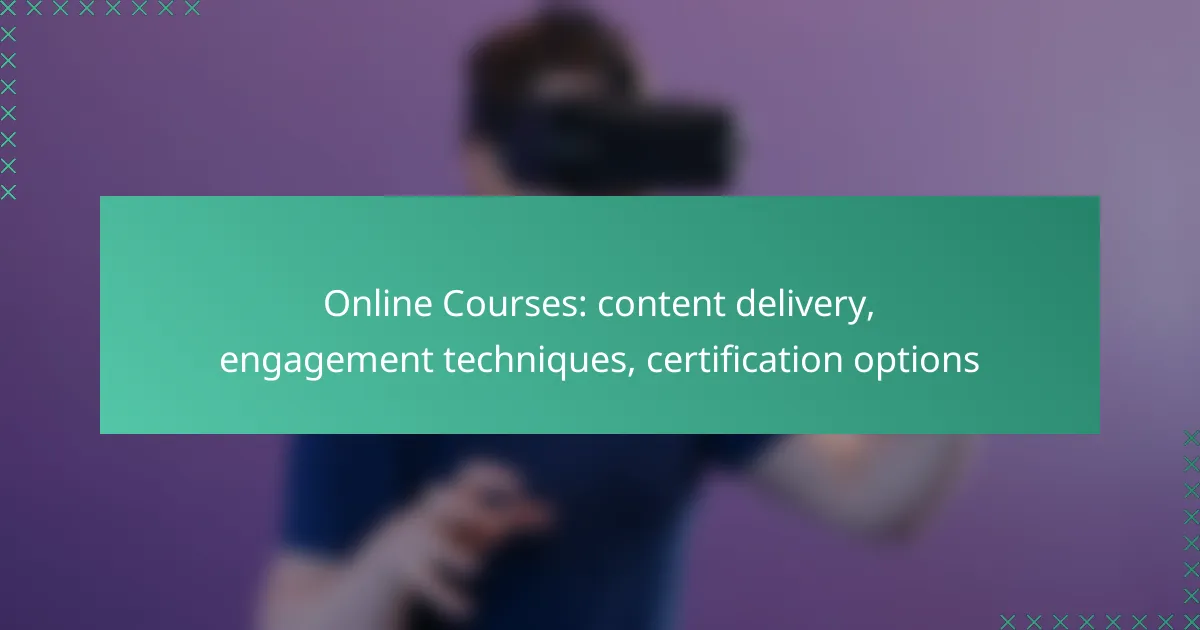Online courses have revolutionized education by providing flexible content delivery methods that cater to diverse learning preferences. By incorporating engagement techniques such as quizzes, discussion forums, and gamification, these platforms enhance learner participation and retention. Additionally, many online courses offer certification options that validate skills and knowledge, boosting career prospects for participants.

What are the best online course platforms in Australia?
The best online course platforms in Australia include Udemy, Coursera, LinkedIn Learning, Skillshare, and edX. These platforms offer a variety of courses across different subjects, catering to diverse learning needs and preferences.
Udemy
Udemy is a popular platform known for its vast selection of courses, often created by independent instructors. Courses cover a wide range of topics, from programming to photography, and are available at various price points, often with discounts.
When considering Udemy, look for courses with high ratings and reviews to ensure quality. The platform frequently offers sales, so you can often find courses at a fraction of their original price.
Coursera
Coursera partners with universities and organizations to provide high-quality courses, many of which can lead to certifications or degrees. This platform is ideal for learners seeking more structured education and recognized credentials.
Courses on Coursera typically include video lectures, quizzes, and peer-reviewed assignments. Consider enrolling in a specialization or professional certificate program if you want to deepen your knowledge in a specific area.
LinkedIn Learning
LinkedIn Learning focuses on professional development, offering courses that enhance skills relevant to the job market. It features a subscription model, allowing unlimited access to its library of courses.
Utilize LinkedIn Learning’s personalized recommendations based on your career interests. The platform also provides certificates upon course completion, which can be shared on your LinkedIn profile to showcase your skills to potential employers.
Skillshare
Skillshare is centered around creative skills, offering courses in areas like design, writing, and entrepreneurship. The platform operates on a subscription basis, granting access to a wide variety of classes.
Skillshare encourages project-based learning, so be prepared to engage in hands-on assignments. This platform is particularly beneficial for those looking to explore new hobbies or enhance their creative skills.
edX
edX offers a range of university-level courses from institutions like Harvard and MIT. Many courses are free to audit, with a fee required for certification, making it a flexible option for learners.
When using edX, consider enrolling in MicroMasters or Professional Certificate programs for a more comprehensive learning experience. The platform’s emphasis on academic rigor makes it suitable for those seeking in-depth knowledge in specific fields.

How to enhance engagement in online courses?
Enhancing engagement in online courses involves utilizing various interactive elements that keep learners actively involved. Techniques such as quizzes, discussion forums, live webinars, and gamification can significantly boost participation and retention rates.
Interactive quizzes
Interactive quizzes serve as an effective tool to reinforce learning and assess comprehension. They can be used at the end of modules or as checkpoints throughout the course to gauge understanding and provide immediate feedback.
Consider using a mix of question types, such as multiple-choice, true/false, and short answer. This variety keeps the quizzes interesting and caters to different learning styles.
Discussion forums
Discussion forums facilitate peer-to-peer interaction and allow learners to share insights and ask questions. These platforms encourage collaboration and can help build a sense of community among participants.
To maximize engagement, set clear guidelines for participation and encourage regular contributions. Consider assigning discussion topics or questions to stimulate conversation and keep discussions focused.
Live webinars
Live webinars provide real-time interaction between instructors and students, allowing for immediate clarification of concepts. They can be used for lectures, Q&A sessions, or guest speaker presentations, making learning more dynamic.
Schedule webinars at convenient times for your audience, and consider recording them for those who cannot attend live. Engaging visuals and interactive polls during the session can further enhance participation.
Gamification techniques
Gamification techniques incorporate game-like elements into the learning experience to motivate students. This can include earning points, badges, or levels based on course completion and participation.
To effectively implement gamification, ensure that the rewards are meaningful and aligned with learning objectives. Balance competition with collaboration to foster a supportive learning environment.

What certification options are available for online courses?
Online courses offer various certification options that validate the skills and knowledge gained by participants. These certifications can enhance career prospects and demonstrate expertise in specific areas.
Accredited certifications
Accredited certifications are awarded by recognized institutions or organizations that meet specific educational standards. These certifications often require passing an exam and may involve a comprehensive curriculum.
Examples include certifications from universities or professional bodies, such as Project Management Professional (PMP) or Certified Information Systems Security Professional (CISSP). These credentials can significantly boost your resume and are often recognized globally.
Industry-recognized badges
Industry-recognized badges are digital credentials that signify the completion of a course or achievement of specific skills. They are often issued by platforms like Coursera or LinkedIn Learning and can be displayed on professional profiles.
These badges typically require less time and commitment than accredited certifications, making them accessible for professionals looking to upskill quickly. However, their recognition can vary by industry, so it’s essential to choose badges from reputable providers.
Micro-credentials
Micro-credentials are short, focused courses that provide certification in specific skills or knowledge areas. They are designed for learners who want to gain expertise without committing to a full degree program.
These credentials can be particularly useful in fast-evolving fields like technology or healthcare, where specific skills are in high demand. Many institutions offer micro-credential programs, allowing learners to stack these certifications toward a larger qualification if desired.

What are the prerequisites for creating an online course?
Creating an online course requires a combination of content expertise and technical skills. These prerequisites ensure that the course is both informative and accessible to learners.
Content expertise
Content expertise refers to a deep understanding of the subject matter you plan to teach. This knowledge allows you to create accurate, engaging, and valuable course materials. Consider your educational background, professional experience, and any relevant certifications as indicators of your expertise.
To effectively convey your knowledge, structure your content logically and include real-world examples. This not only enhances comprehension but also keeps learners engaged. Aim for a balance between theory and practical application to cater to various learning styles.
Technical skills
Technical skills are essential for developing and delivering an online course effectively. Familiarity with learning management systems (LMS), video editing software, and basic graphic design can significantly enhance the quality of your course. If you are not comfortable with these tools, consider taking short courses or tutorials to build your skills.
Additionally, understanding how to create engaging multimedia content, such as videos and interactive quizzes, can improve learner retention. Make sure to test your course materials on different devices to ensure compatibility and accessibility for all users.

How to choose the right online course format?
Choosing the right online course format depends on your learning style, schedule, and goals. Consider whether you prefer flexibility or structured guidance, as each format offers distinct advantages and challenges.
Self-paced courses
Self-paced courses allow learners to progress through the material at their own speed, making them ideal for those with busy schedules or varying learning paces. These courses often include pre-recorded videos, readings, and quizzes that can be accessed anytime.
When selecting a self-paced course, check for clear deadlines for assignments or assessments to maintain motivation. Look for platforms that offer community forums or support to enhance engagement, as this can help mitigate feelings of isolation.
Examples of popular self-paced platforms include Coursera and Udemy, where you can find courses across various subjects, often priced between $20 and $200, depending on the content and instructor.
Instructor-led courses
Instructor-led courses provide a structured learning environment with scheduled classes, live interactions, and direct feedback from educators. This format is beneficial for learners who thrive on accountability and prefer real-time engagement.
Consider the level of interaction you desire when choosing an instructor-led course. Look for options that include live Q&A sessions, group discussions, and personalized feedback to enhance your learning experience. Be aware that these courses may have a higher cost, often ranging from $100 to $1,000, depending on the institution and course length.
Platforms like edX and LinkedIn Learning offer instructor-led courses across various fields, ensuring that you can find a course that meets your specific needs and learning objectives.
